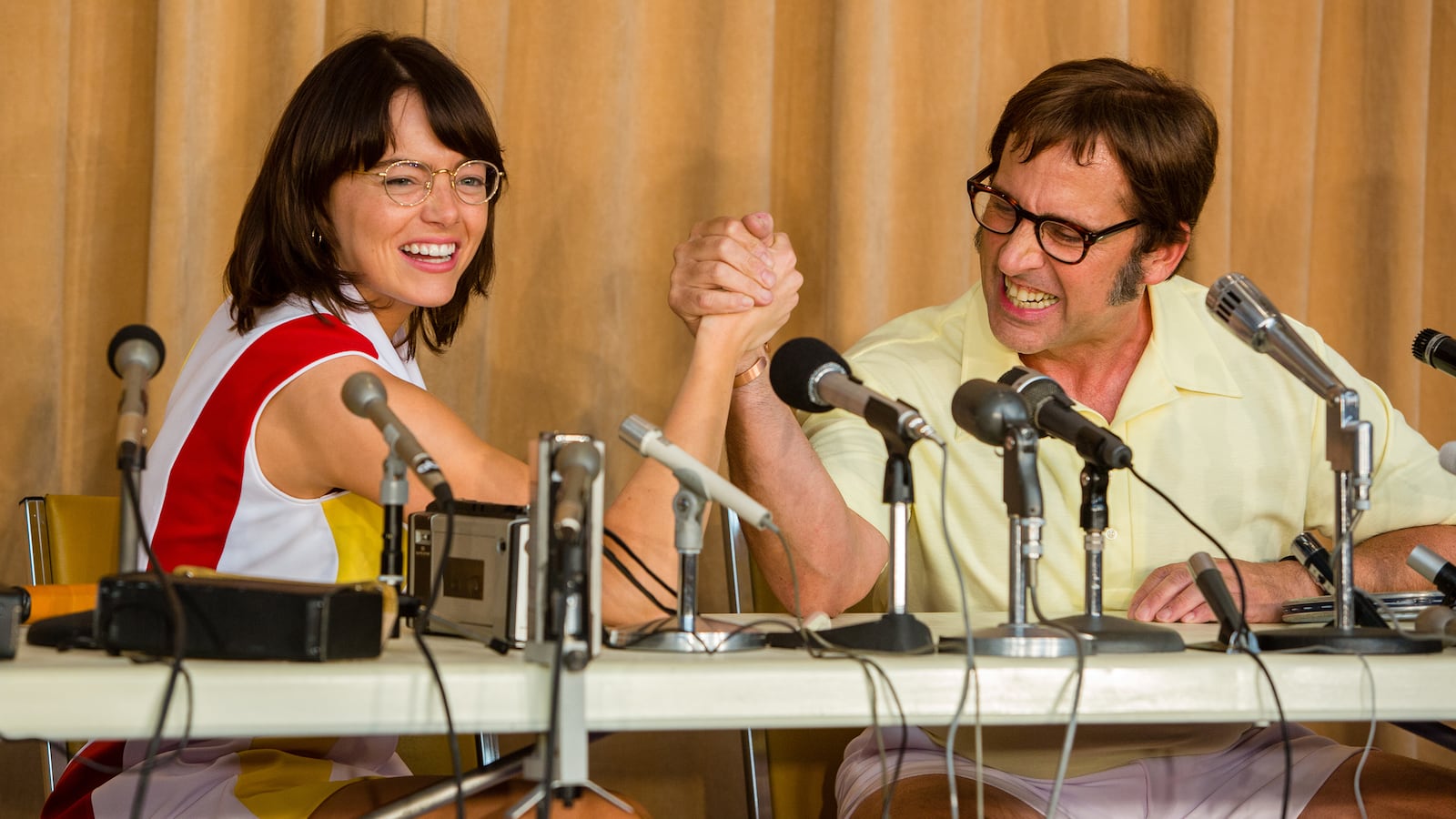Some version of the same question comes up in nearly every interview with the directors and stars of the new film Battle of the Sexes, in theaters this Friday: Did you realize you were making a movie about the 2016 election?
The parallels between the 1973 tennis match between Billie Jean King and Bobby Riggs and the 2016 election between Hillary Clinton and Donald Trump are undeniable.
King herself drew the comparison as early as last July, during Wimbledon, when she said, straightforwardly, of Trump, “He’s Bobby Riggs. And Hillary is me.
“The only difference between Trump and Hillary and me and Bobby is that I didn’t have to put up with Bobby for a year and a half before the match,” King added. “Another difference with me is that in my world, I just needed a racket to do my talking.”
At 29, King was the most talented rising star in tennis, a strong leader, and soon-to-be LGBT icon who helped found the Women’s Tennis Association in 1973 as a way to pressure the USTA to give female players equal prize money. All she wanted was to be taken seriously as an athlete and while she loathed the idea of going up against a clown like the former champ Riggs, she knew that beating him could help further the cause of women’s liberation for generations.
Riggs, long past his prime at 55 years old, was eager to play the role of chauvinist pig if it meant getting attention from the press and a possible $100,000 payout if he won the circus-like match. He began by beating Margaret Court, then the No. 1 women’s player in the world. But he was even more excited to take on King because she was the bigger star.
“We began shooting in the spring of 2016, when there was still a lot of hope in the air,” Emma Stone, who plays King, said in another interview not long ago, “and it was very interesting to see this guy—this narcissistic, self-focused, constantly-stirring-the-pot kind of guy—against this incredible, qualified woman, and at the same time be playing Billie Jean, with Steve [Carell] playing Bobby Riggs.”
Steve Carell, meanwhile, says that he was drawn to the role because even when he watched the match at 11-years-old, he could tell Riggs was “playing a character.” Much like Trump, Riggs would say whatever outrageous thing he could think of if it meant burnishing his credentials as the most misogynistic athlete in America. “I love women, in the bedroom and in the kitchen,” Riggs infamously said during a pre-match press conference with King.
“We didn’t know that Trump would be the candidate for the Republican Party, and obviously he ended up being quite Bobby Riggs-ian,” Jonathan Dayton, who co-directed the film with his wife Valerie Faris, told Uproxx’s Mike Ryan earlier this month. “You know, I wish he was as benign as Riggs.”
But even with all of those obvious parallels, there is one big difference. Spoiler alert for those who don’t know the real story and don’t want the ending of the film ruined—King wiped the floor with Riggs in three straight sets.
“I underestimated you,” Riggs tells King after their match. It’s a genuinely sweet moment and the type of gracious gesture, belying his fundamental humanity, that we have never seen from Donald Trump.
After a year in which voters denied an overqualified woman the chance to become president, there is something sublimely satisfying about watching King’s confident victory over Riggs in Battle of the Sexes. Even if you know it’s coming, there is a fear that the same type of unexpected fortune reversal we saw in 2016 will occur on the court. As Stone’s King privately sobs in her locker room after the match, it’s hard not to imagine the triumphant catharsis so many women (and men) would have felt had we elected the first female president of the United States.
In her new campaign memoir What Happened, Hillary Clinton provides a similar type of wish fulfillment when she writes about what many of her supporters believe she should have done during her second debate with Trump. The country was still reeling from Trump’s “grab ’em by the pussy” Access Hollywood tape when he started stalking her around the stage, something Clinton says made her “skin crawl.”
“Well, what would you do? Do you stay calm, keep smiling, and carry on as if he weren’t repeatedly invading your space?” she writes. “Or do you turn, look him in the eye and say loudly and clearly: ‘Back up you creep, get away from me. I know you love to intimidate women, but you can’t intimidate me, so back up.’”
In an interview with Fresh Air’s Terry Gross this past week, Clinton said that she believes those comments would have simultaneously “delighted” her supporters and “enraged” Trump fans. “And it would have been troubling to a lot of people still trying to make up their mind one way or the other,” she added, “because anger from a woman, at least up until now, is seen as off-putting and somewhat frightening to people.”
Since, as King said, she did her fighting on the court as opposed to the debate stage, this is something she didn’t have to worry as much about. And Clinton certainly knows a lot about dealing with sexism. But in 2017, it seems at least possible that, just as Riggs underestimated King, Clinton may be underestimating how many American voters might not have minded a little more passion from her.
It’s something any woman who is considering taking on Trump in the 2020 election might keep in mind. Whether it’s Elizabeth Warren or Kirsten Gillibrand or Kamala Harris, they won’t be able to let themselves get rattled by Trump the way Margaret Court did in her match with Riggs. Instead, perhaps they should take a page out of Billie Jean King’s book and be confident that they can hit back just as hard.






